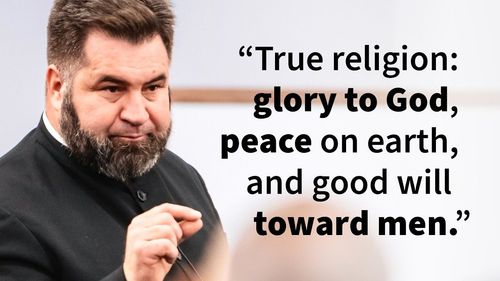In the book of Luke, we read the rare and vivid account of an exchange between two men who had crossed over from this life into eternity. Lazarus, having lived righteously, had been carried by angels to Paradise; while the rich man, having neglected his soul, had after death lifted up his eyes in hell. Experiencing the horrors of a godless eternity, the rich man now had to grapple not only with the reality of his own sealed fate, but also with the consciousness that his brothers were headed quickly toward the same ruin in comparative oblivion. Perhaps they knew they were in danger of punishment, but they had no idea of the magnitude of torment the rich man was now facing. They must be warned, he knew, and in desperation he pleaded that Lazarus be sent to awaken them to their need of repentance.
“Then he said, I pray thee therefore, father, that thou wouldest send him to my father’s house: For I have five brethren; that he may testify unto them, lest they also come into this place of torment. Abraham saith unto him, They have Moses and the prophets; let them hear them. And he said, Nay, father Abraham: but if one went unto them from the dead, they will repent. And he said unto him, If they hear not Moses and the prophets, neither will they be persuaded, though one rose from the dead” (Luke 16:27-31).
The poignancy of the rich man’s plea is touching. He knew the urgency of getting the message through. He knew that unless they heeded the warning, his brothers were doomed to a state of torment, the agony and endlessness of which they could not understand. He himself had despised Lazarus in life, yet perhaps, if Lazarus would return from the dead, his brothers would listen. But the response was firm: let them deal with the messengers they have already been sent. If they will not hear the common messenger, they will not hear the uncommon.
That such a fateful decision as the choice of the soul’s eternal destiny should be entrusted to time-bound, frail humanity is a staggering thought. Man is frail in comprehension, frail in judgment, frail and limited in the scope of his vision and evaluative ability. Bombarded with sensory input from a world very transient and perishable, and preoccupied with its temporal cares, he is liable to be blinded to the wider realities of timeless life or death. Without a messenger from that other world, he is prone to err–prone to misjudge. And the cost for error is heavy.
Throughout history, God has sent messengers to instruct mankind and guide him into making the right decisions. Some of these messengers have been supernatural beings, but more often, as with Moses and the prophets, they have come in the form of flesh and blood. God knows humanity’s frailty and his need of a guide, a shepherd, a prophet, a watchman, an overseer. In merciful love, He has divinely created, called, and commissioned men of special gifting and vision to fill the gap in humanity’s knowledge. He has prospered or judged men and nations according to how they have handled His messengers.
Lot’s escape from Sodom depended upon his response to God’s messengers. Lot was a righteous man vexed with Sodom’s evil deeds. When God sent messengers to warn him of impending judgment, he received them well and listened to their message. Still, his mind struggled to grasp the full import of their words. Either slow to cut off old attachments or simply too overcome to think clearly in the moment of crisis, Lot lingered dangerously in the doomed city. Comprehending what he could not, the angels took hold of his hand and the hands of his family members, and fairly carried him to safety. He survived by yielding them his hand.
Jacob, about to face the brother he had cheated, and finding himself alone in a wrestling match with God, recognized that the success or failure of his whole life’s course hinged at that point on the success or failure of his interaction with the angel. As the night wore on and the struggle gained intensity, he was crippled by the angel’s own hand; but finding the courage to hold on until the angel chose to bless him, he walked away a changed man. These were supernatural encounters, but they are by far not the only recorded instances of God’s intervening to send help or judgment by the hand of a messenger uniquely in contact with heaven. The country of Egypt was judged and the nation of Israel called out of bondage by the hand of Moses. Korah and his company were swallowed by the earth for rebelling against Moses the man. Israel suffered more than three years of no rain at the word of Elijah but saw the windows of heaven opened again in answer to his prayer.
In the same way, prophet after prophet was sent from God to the people with messages of warning or exhortation. Some heard and found healing, salvation, and enlightenment. Others rebelled to their own perdition.
Scripture speaks to us of heavenly treasure sent to us in earthen (human) vessels (2 Cor. 4:7). How often have we been tempted to undervalue the messengers God has sent our way on express mission to warn us of error or to uncover some unsuspected plot of the enemy? How often have we been tempted to question their message because it did not match with our thinking? They are human. They are one of us. They may even, as Moses, have made some mistake. They appear, while among us, in many respects as commoners. But they are the farthest thing from common. And while we look for God’s communications through special events or uncommon means, we are in danger of missing the extreme value of the messengers we have been sent.
We have but one life to live and but one chance to make the choice that will land us in eternal blessing or eternal torment. The choice is too big to make casually. May we open our hearts to the message from heaven and reach out in faith to those heaven has sent.


